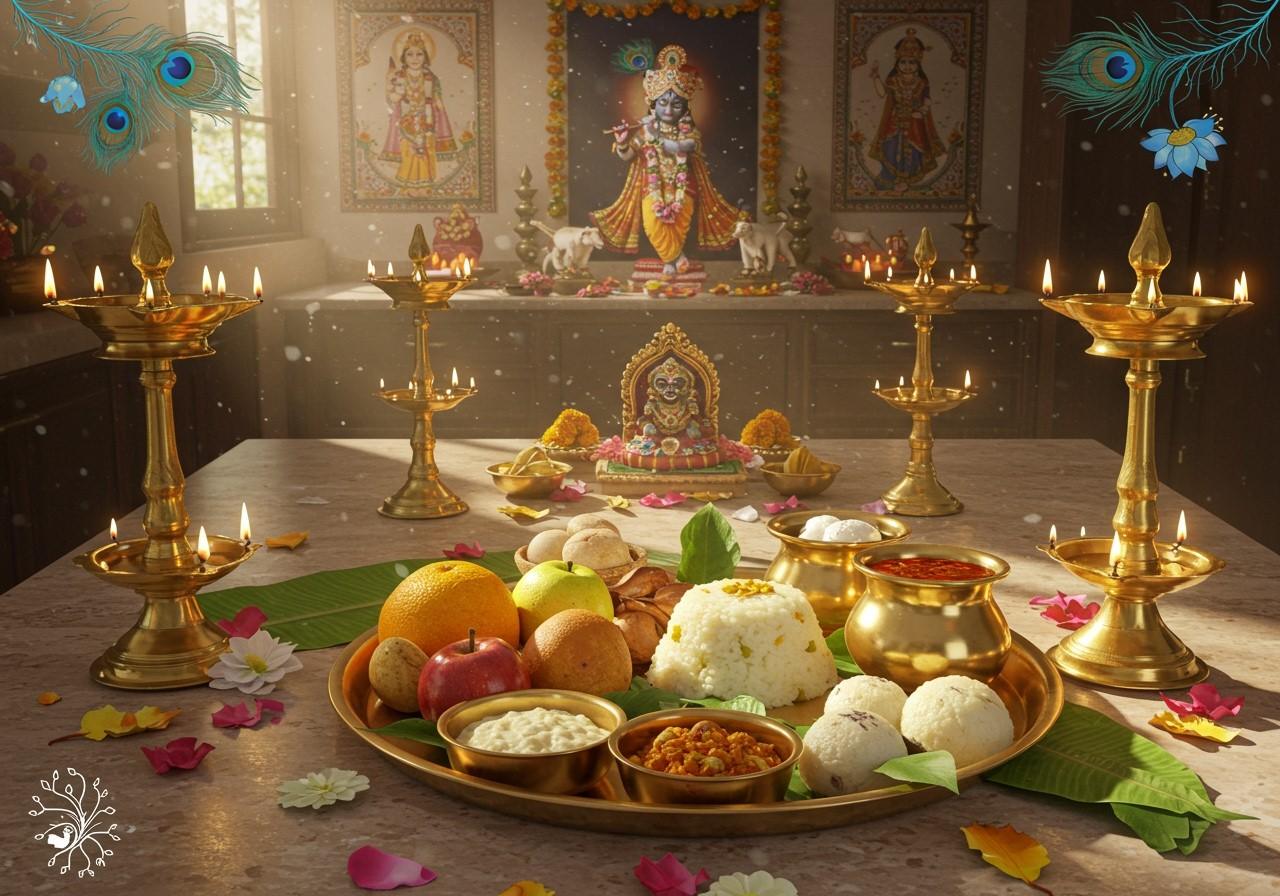
Vaishnavism, a major tradition within Hinduism, centers around devotion to Vishnu and his incarnations. Food plays a crucial role, not just for sustenance, but as a medium of devotion and spiritual practice. This guide explores the significance of food in Vaishnavism, covering traditional diets, rituals, and the cultural importance of offerings to deities.
Historical Context of Food in Vaishnavism
Food practices in Vaishnavism have deep roots. Ancient scriptures like the Bhagavad Gita and the Puranas outline dietary guidelines and emphasize the spiritual importance of food offerings. These texts guide devotees on suitable foods for consumption and offerings. Temples are vital in preserving these traditions, preparing prasad (sacred food) and hosting communal feasts.
Festivals like Janmashtami (Krishna’s birth) and Rama Navami (honoring Lord Rama) highlight the central role of food. Elaborate feasts and offerings are prepared, reflecting devotion and reverence.
The Vaishnava Diet
The Vaishnava diet emphasizes sattvic foods – pure, light, and conducive to spiritual growth. Common inclusions are:
- Fruits: A variety of fruits are consumed for their natural sweetness and nutritional value. They are considered pure and energizing.
- Vegetables: Fresh, seasonal vegetables form a core part of the diet, providing essential vitamins and minerals. Leafy greens and root vegetables are commonly used.
- Grains: Rice, wheat, and other grains provide carbohydrates for energy. They are often prepared as simple dishes like rice or roti.
- Nuts and Seeds: Almonds, cashews, and other nuts and seeds are consumed for their healthy fats and protein content. They are also used in preparing sweets and desserts.
- Dairy Products: Milk, yogurt, and ghee (clarified butter) are considered pure and are used in many dishes. They are believed to enhance physical and spiritual well-being.
Meat, fish, and eggs are excluded, promoting non-violence. Certain spices and herbs, like turmeric and tulsi (holy basil), are essential in Vaishnava cooking. Some Vaishnavas also avoid vegetables like beets, eggplant, and carrots, as well as onions and garlic, due to their classification as rajasic or tamasic foods. This practice, however, isn’t universally observed. The diet’s core principles are non-violence and compassion, aligning with broader Hindu dietary ideals. Meals are prepared with devotion and care, with cooking itself seen as an act of worship.
The Role of Prasad
Prasad, food offered to deities and then consumed by devotees, is central to Vaishnava practice. The offering transforms food into a divine blessing. Prasad varies depending on the deity and occasion. For instance, sweets like laddus and kheer are common offerings to Krishna during Janmashtami. Sharing prasad fosters unity and shared devotion. Temples like the Jagannath Temple in Puri are renowned for their unique prasad.
Daily Food Rituals
Daily food rituals are significant. Tulsi leaves added to offerings are believed to enhance spiritual benefits. Cooking with devotion and cleanliness is considered a form of worship. Morning and evening rituals include food offerings. Special dishes are prepared for religious observances. Chanting and meditation during preparation infuse spiritual energy into the food.
Cultural Significance
Vaishnava food practices deeply influence social norms and community interactions. Food traditions are integral to festivals, marriages, and ceremonies, strengthening cultural continuity. The dietary practices, aligning with Ayurvedic principles, promote health and well-being. Devotees often share personal experiences about their connection to these traditions, emphasizing food’s role beyond mere sustenance.
Modern Adaptations
Vaishnava food practices adapt to contemporary life. Devotees balance traditional practices with modern dietary needs. Online platforms provide access to Vaishnava-friendly products. Global cuisine influences Vaishnava cooking, resulting in fusion dishes that respect traditional guidelines. Communities promote sustainable and organic farming, aligning with non-violence and compassion.
How Poojn.in Supports Vaishnav Food Offerings
Poojn.in offers a wide range of products for Vaishnav devotees to prepare authentic food offerings (bhog) and maintain ritual purity:
- Utensils: Pure copper and brass utensils ideal for Vaishnav food preparation and offerings. Explore our collection of brass items.
- Thalis and Bowls: Traditional thalis and bowls crafted from approved materials like silver and kansa for serving and offering food. Find traditional servingware here.
- Dry Fruits and Nuts: High-quality dry fruits and nuts perfect for preparing prasad and incorporating into Vaishnav recipes. Shop now for premium dry fruits and nuts.
- Pure Ghee: Certified pure ghee for cooking bhog and adding a rich flavor to traditional dishes. Purchase pure ghee here.
Visit www.poojn.in to explore our complete range of Vaishnav puja items and kitchen essentials.
Conclusion
Food in Vaishnavism transcends mere nourishment; it’s a vital aspect of worship, spiritual practice, and cultural expression. From ancient scriptures to daily rituals, food connects devotees to their faith. The Vaishnava diet, prasad, and food offerings symbolize purity and devotion. Festivals and communal feasts strengthen unity and shared values. Modern adaptations ensure these practices remain relevant, preserving cultural heritage and promoting well-being.
FAQs
What is the significance of food in Vaishnavism? Food is sacred, representing devotion and gratitude to Lord Vishnu.
What foods are typical in a Vaishnava diet? Fruits, vegetables, grains, dairy, and nuts are common, while meat, fish, and eggs are avoided.
Why is meat avoided? Meat is considered tamasic, potentially increasing ignorance and laziness, hindering spiritual growth.
Are onions and garlic allowed? They are generally avoided, classified as rajasic, potentially disrupting mental tranquility.
How are meals prepared? Meals are prepared with care, purity, and often accompanied by prayers and chants.
Can Vaishnava food be offered to anyone? Yes, after being offered to Lord Vishnu, it becomes prasadam and can be shared.
Is fasting common? Yes, fasting, like on Ekadashi, purifies the body and mind, demonstrating devotion.
What is prasadam? Prasadam is food offered to Lord Vishnu, considered blessed and shared as divine grace.


